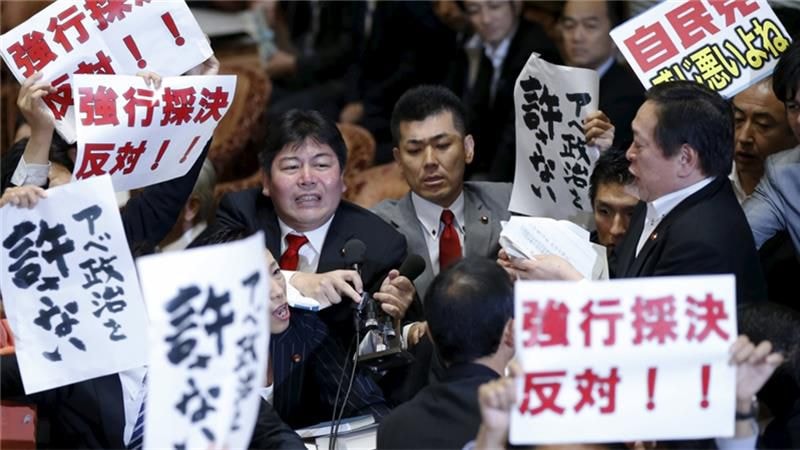Japan's Security Bill: First Steps to Remove Barriers Despite Controversy
(Baonghean) - Despite objections, a lower house committee has passed bills that mark the beginning of a significant change in Japan's defense policy. Accordingly, the country's military will be allowed to participate in collective self-defense activities.
After nearly 120 hours of debate over several months, a special committee of the Japanese House of Representatives approved a controversial package of security bills on July 15. These bills are expected to be clearly presented in the House of Representatives - where the country's ruling coalition controls two-thirds of the members - this morning, July 16.
The law is seen as part of Prime Minister Shinzo Abe's efforts to reinterpret Japan's strict post-World War II pacifist constitution.
The issue has sparked an emotional political debate in Japan, with lawmakers shouting and holding placards during the vote to show their opposition to the bills. On July 14, around 20,000 people joined a protest in Tokyo against the bills.
Abe’s goal is to restore full sovereignty to Japan 70 years after the end of World War II. But the path to achieving that is deeply controversial in the country, both legally and politically.
 |
| Japan's security bill was passed by the House of Representatives Committee on July 15. Photo: Reuters. |
Last year, Mr Abe's cabinet reinterpreted Article 9 of the constitution - which denies the right to war - to argue that the country does have a right to collective self-defense. In doing so, Mr Abe avoided a parliamentary vote and then a referendum, both of which would be needed to amend the constitution.
In his speech to the US Congress in April, the Japanese prime minister promised sweeping changes to security laws by the end of the summer, with the aim of allowing Japan’s Self-Defense Forces to fight alongside its sole military partner, the US, and other countries in the event of a clear threat to Japan’s survival.
Under the current interpretation of Japan’s constitution, such joint military operations are not allowed, even in the event of an attack on the country. However, contrary to Abe’s announcement in Washington, the new security laws contain only minor changes.
Deutsche Welle quoted Robert Dujarric, a political analyst at Temple University in Japan, as saying that while the law facilitates closer military ties with the US and other countries in the region such as Australia, it is unrealistic to think that this will force Japan to get involved in every military conflict the US is involved in.
And while the laws allow Japan to participate in UN peacekeeping missions, Tokyo will not be allowed to deploy combat troops. However, a recent survey by Nihon TV found that 59% of respondents disagreed with the latest changes, with just 24% of those surveyed supporting them.
Abe's approval rating has now fallen to its lowest level since he began his second term in 2012. "We have not made an effort to make people understand this message," said Shigeru Ishiba, a member of the ruling Liberal Democratic Party (LDP).
Notably, legal scholars have a negative view on the issue. Yasuo Hasabe, a constitutional expert at Wasena University in Tokyo, said: “98% of experts consider these laws unconstitutional.”
Also according to Deutsche Welle, Kenji Ishikawa of the University of Tokyo mentioned the phrase “coup”, while Sota Kimura of Tokyo City University said this move “endangers the rule of law”. Famous pacifist in Japan Hayao Miyazaki recently expressed what may exist in the thoughts of the silent majority in this country: “I think that it is impossible to use military force to stop China’s expansion, but Japan has a peaceful constitution so that other solutions can be thought of”.
Miyazaki's statements upset the conservative government, as Abe's new defense policy is actually tilted toward working with the US to counter China's growing power and assertiveness in Asia.
At the same time, Tokyo hopes that Washington will be increasingly willing to fight alongside Japan in the event of a military conflict over the disputed Senkaku/Diaoyu Islands. However, Abe has avoided directly naming China as an opponent in order to keep relations with Beijing from deteriorating further.
So far, Prime Minister Abe has only mentioned one scenario in which Japan's armed forces could be deployed abroad: if Japan's oil supplies were blocked in the Strait of Hormuz, which connects the Arabian Sea with the Persian Gulf.
However, this scenario seems quite unrealistic as Japan is no longer as dependent on Arab oil as it once was. Moreover, members of the Prime Minister’s party recently blocked the publication of this year’s defense white paper, arguing that it would highlight China’s hegemonic ambitions in the region and Beijing’s island-building activities in the South China Sea.
Meanwhile, Al Jazeera also commented that Japan's passing of the bills is clearly an important step to pave the way for the country to enforce the law and expand its military role. The Japanese Prime Minister sees the urgency of making the military stronger, to be able to counter potential enemies in the future. Therefore, it can be said that the bill allows the Japanese military to hold a greater position, including protecting allies under attack. Not only that, they also expand the international peacekeeping role of the cherry blossom country's military, although there are many opposing opinions and many deep concerns about this remarkable information.
Phu Binh






